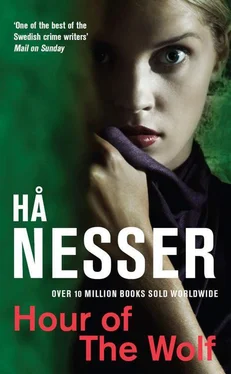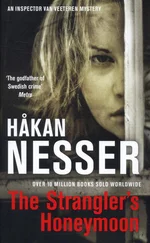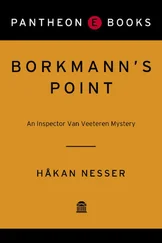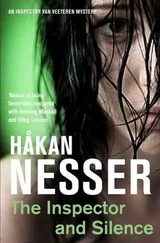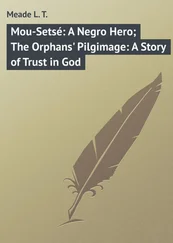Hakan Nesser - Hour of the wolf
Здесь есть возможность читать онлайн «Hakan Nesser - Hour of the wolf» весь текст электронной книги совершенно бесплатно (целиком полную версию без сокращений). В некоторых случаях можно слушать аудио, скачать через торрент в формате fb2 и присутствует краткое содержание. Жанр: Полицейский детектив, на английском языке. Описание произведения, (предисловие) а так же отзывы посетителей доступны на портале библиотеки ЛибКат.
- Название:Hour of the wolf
- Автор:
- Жанр:
- Год:неизвестен
- ISBN:нет данных
- Рейтинг книги:5 / 5. Голосов: 1
-
Избранное:Добавить в избранное
- Отзывы:
-
Ваша оценка:
- 100
- 1
- 2
- 3
- 4
- 5
Hour of the wolf: краткое содержание, описание и аннотация
Предлагаем к чтению аннотацию, описание, краткое содержание или предисловие (зависит от того, что написал сам автор книги «Hour of the wolf»). Если вы не нашли необходимую информацию о книге — напишите в комментариях, мы постараемся отыскать её.
Hour of the wolf — читать онлайн бесплатно полную книгу (весь текст) целиком
Ниже представлен текст книги, разбитый по страницам. Система сохранения места последней прочитанной страницы, позволяет с удобством читать онлайн бесплатно книгу «Hour of the wolf», без необходимости каждый раз заново искать на чём Вы остановились. Поставьте закладку, и сможете в любой момент перейти на страницу, на которой закончили чтение.
Интервал:
Закладка:
FOUR
18
Jochen Vlaarmeier had been driving buses between Maardam and Kaustin for more than eleven years.
Six trips in each direction. Every day. Apart from his days off in accordance with the company rota. And the occasional week’s holiday, of course.
The first and last trip of every day were pointless, in a way. But only in a way. There was no sensible reason to drive out to Kaustin at half past six in the morning, and no sensible reason to drive back from there twelve hours later. But the bus spent its nights in the garage in Leimaar Alle, and Vlaarmeier had nothing against driving an empty bus now and then. Nothing at all. Over the years he had begun more and more to regard passengers as an annoying aspect of his work, and he reckoned the evening drive back to Maardam among the best parts of his life. No traffic on the roads. An empty bus and another day’s work over and done with. What more could anybody ask for?
On Sundays the number of trips was reduced to four. Two in each direction. He drove out to Kaustin at nine a.m. — an empty bus was always guaranteed — and returned at ten o’clock with a cargo of four farmers’ wives on their way to morning service in Keymer Church. Because their own church wasn’t good enough, for some reason. Or perhaps their village church wasn’t functioning any more. Vlaarmeier had no time for things sacred ever since he lost a girlfriend to a callow theology student thirty years ago.
At two o’clock he would drive the farmers’ wives back home again. By then they would have partaken of coffee and cakes at Heimer’s cafe in Rozenplejn.
Always the same four. Two dumpy little women, two emaciated and hunched up. He had often wondered why the company didn’t arrange for a taxi instead. It would have been much cheaper.
This cold Sunday — 29 November — there were only three, as fru Willmot, one of the dumpy ones, had flu. This was announced by the windswept fru Glock when she clambered aboard outside the school.
Thirty-eight degrees and two swollen tonsils, she informed him. A running cold and aches and pains all over. Just so that he knew.
It was also fru Glock who screamed so loudly that he almost drove into the ditch. It happened shortly before the long bend into the village of Korrim, and it sounded as if a seagull had flown into Vlaarmeier’s ear.
He managed to get the bus back on course, and glanced at the inside mirror. The old lady was half-standing and hammering away with her hand on the side window.
‘Stop the bus!’ she screeched. ‘Oh my oh my, stop for God’s sake!’
Jochen Vlaarmeier slammed on the brakes and pulled up at the side of the road. Oh hell, he thought. One of them has had a stroke.
But when he looked at the back of the bus he could see that all of them were hale and hearty. Or at least, in no worse a condition than usual. The two sitting further back were gaping open-mouthed at fru Glock who was still hammering on the window and yelling incomprehensibly. He sighed, left his cabin and walked towards her.
‘Calm down now,’ he said. ‘Take it easy. What on earth’s got into you?’
She stopped screaming. Swallowed twice, making her false teeth click, and stared at him.
‘A body,’ she said. ‘A woman… Dead.’
‘What?’ said Vlaarmeier.
She pointed towards a black-looking field behind the bus.
‘Over there. At the side of the road. A body.’
Then she flopped down on the seat with her head in her hands. The other two ladies came striding along the centre aisle and started crossing themselves somewhat doubtfully.
‘A body?’ said Vlaarmeier.
She knocked on the window again and pointed. Vlaarmeier thought for a moment. Then he opened the pneumatic door, got out of the bus and started walking back along the edge of the road.
He found her after about twenty-five metres. Diagonally over the shallow ditch that separated the road from the newly ploughed field was the body of a woman. It was wrapped up in what looked like a sheet
… A very dirty sheet, its edges flapping slightly in the breeze, that left one leg and part of her upper torso bare. Two large, white breasts and arms spread out at unnatural angles. She was lying on her back, her face staring straight up at the sky but largely hidden by her wet, reddish hair that seemed to have stuck fast to it somehow.
Oh Christ, thought Vlaarmeier. For Christ’s bloody sake. Then he sicked up the whole of his substantial breakfast — both the porridge and the sausage and eggs — before staggering back to the bus in order to telephone for help.
By the time Chief Inspector Reinhart and Inspector Moreno got to the village of Korrim it had started snowing. Large white flakes were floating diagonally down and melting on the wet, black soil.
A patrol car with two constables, Joensuu and Kellermann, was already on the spot. Joensuu was standing on the road next to the dead woman, with his back towards her and his arms folded over his chest. Legs wide apart, and uncompromising. Kellermann was standing beside the bus, pen and notebook in hand, talking to the driver and passengers. Three old women were standing pressed up against each other by the side of the yellow bus, as if they were trying to keep one another warm. All three were wearing dark-coloured overcoats and ghastly hats. They reminded Reinhart of crows, their feathers ruffled, jumping around on the road looking for scraps of food. The driver was marching nervously up and down, smoking.
Why don’t they sit inside the bus instead? Reinhart wondered. Haven’t they noticed that it’s snowing?
He ordered Moreno to go and assist Kellermann, and approached Joensuu in order to look at what he needed to look at.
For two seconds at first. Then he closed his eyes for five. And then looked once more.
That was what he always did. He didn’t know if it made things any easier, but it had become a sort of ritual over the years.
Anyway, a dead woman. Almost certainly naked, but inadequately wrapped up in something looking like a sheet, exactly as Vlaarmeier had said on the telephone. She was lying more or less flat on her back, her head resting on a clod of earth, her feet just reaching as far as the narrow strip of grass verge. Red toenails in the midst of all the mess, he noted: it looked almost surreal, or at any rate intensified the impression of unreality. Quite a well-built body, as far as he could judge. Somewhere between thirty and forty, it seemed, but that was only a guess, of course. Her face was largely hidden by her longish, dark red hair. Snowflakes were falling on the woman as well — as if the sky had wanted to cover up what it preferred not to see, it struck him. A tactful shroud. That was typical of the thoughts that usually occurred to him on occasions like this. Words, phrases, images: the same vain attempt to cover up the truth that the sky was busy with, more or less.
‘What a bloody mess,’ said Joensuu. ‘A good-looking woman. Not now, of course…’
‘How long have you two been here?’ asked Reinhart.
Joensuu checked his watch.
‘Fourteen minutes,’ he said. ‘We got the call at ten thirty-nine. We were here by fifty-eight.’
Reinhart nodded. Clambered down from the road, bent over the body and studied it for a few seconds.
‘Blood,’ said Joensuu without turning round. ‘There’s blood on the sheet. And on her head. Somebody’s clocked her one there.’
Reinhart stood up and clenched his fists in his pockets. The sheets — for there seemed to be two — were stained not only by soil and dirt: there was a series of stripes and drops of blood over one of her shoulders, and as Kellermann had said, her hair on the left side of her head and face was clogged with something that could hardly be anything else but blood.
Читать дальшеИнтервал:
Закладка:
Похожие книги на «Hour of the wolf»
Представляем Вашему вниманию похожие книги на «Hour of the wolf» списком для выбора. Мы отобрали схожую по названию и смыслу литературу в надежде предоставить читателям больше вариантов отыскать новые, интересные, ещё непрочитанные произведения.
Обсуждение, отзывы о книге «Hour of the wolf» и просто собственные мнения читателей. Оставьте ваши комментарии, напишите, что Вы думаете о произведении, его смысле или главных героях. Укажите что конкретно понравилось, а что нет, и почему Вы так считаете.
